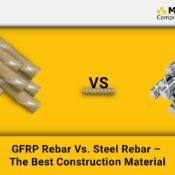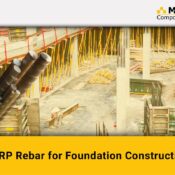In Saudi Arabia, where temperatures often exceed 50°C. Construction faces extreme environmental challenges. In Saudi Arabia the construction industry uses steel rebar. By using Steel rebar construction cracks, corrosion, and structure failures. That’s why GFRP rebar for high-temperature applications is emerging as a game-changer in modern construction material.
In this article, We will check about GFRP Rebar - Glass Fiber Reinforced Polymer. How GFRP Rebar is an ideal construction material for High temperature.
Understanding the High-Temperature Challenge in Construction
Construction in hot climates like Saudi Arabia poses unique material stress challenges:
- Summer surface temperatures of concrete can reach 70–80°C.
- Winter night lows can drop below 10°C.
- These fluctuations cause continuous thermal expansion and contraction.
Why Steel Fails in High Temperatures
Steel rebar, though widely used, suffers in such extreme environments due to:
- Thermal Expansion Mismatch – Steel expands more than concrete, causing internal pressure and cracking.
- Strength Degradation – Prolonged heat exposure weakens steel’s tensile properties.
Such issues drastically reduce the lifespan of infrastructure and increase long-term maintenance costs—especially concerning mega-projects intended to last 50–100 years.
Why GFRP Rebar Excels in High-Temperature Applications
1. Thermal Stability from -60°C to 80°C
GFRP Rebar can handle high temperatures. GFRP rebar consists of glass fibers in a polymer resin matrix - resists thermal degradation, making it perfect for climates with extreme temperature swings.
2. Corrosion Resistance
GFRP Rebar is a corrosion resistant material. Unlike steel, GFRP does not rust or corrode—even when exposed to:
- Saltwater
- Chemicals
- Ground moisture
This makes it ideal for coastal construction, where steel reinforcement typically fails within 10–15 years.
3. Matching Thermal Expansion with Concrete
The thermal expansion coefficient of GFRP is similar to concrete. This compatibility prevents:
- Crack formation
- Structural distortion
- Concrete spalling
This eliminates one of the main failure points associated with traditional steel rebar in hot environments.
Proven Applications of GFRP Rebar in Hot Regions
Desert Infrastructure Projects
In Saudi Arabia, highways, bridges, and overpasses built with GFRP rebar have shown no signs of cracking or degradation—unlike their steel-reinforced counterparts, which often deteriorate within 5–7 years.
Coastal and Marine Structures
GFRP is being used in:
- Seawalls
- Jetties
- Offshore platforms
- Desalination plants
Its resistance to heat, salt, and UV exposure makes it a reliable long-term solution.
High-Profile Mega Projects
Industries are already adopting GFRP for:
- Solar power facilities exposed to continuous high heat
- Water treatment plants with chemical-heavy environments
- Transport infrastructure requiring decades of durability
GFRP Rebar vs Steel Rebar: Cost-Benefit Analysis in Hot Climates
- Corrosion resistant: GFRP Rebar is compatible with water, salt water, and other chemicals. It does not rust and corrode. Where else Steel rebar is not a corrosion resistant material. By using it, construction weakens and fails.
- Lighter: GFRP Rebar is ¼ lighter than traditional steel rebars. The transportation of GFRP Rebar is very easy.
- Stronger: GFRP Rebar is 2 times stronger than traditional steel rebar. GFRP Rebar makes the construction stronger at light weight.
- Durable: GFRP Rebar is a corrosion resistant, stronger, lighter, non-conductive. So It completes the construction requirements and increases the lifespan of construction.
You can check more in GFRP Rebar vs steel rebar.
Installation Tips for GFRP Rebar in High-Temperature Zones
To ensure maximum performance in hot climates:
- Store with cover: Avoid direct sunlight during storage.
- Use diamond blades: For cutting GFRP instead of steel tools.
- Non-metallic tie wires: Prevents corrosion points.
- Consult specialists: Ensure design optimization for thermal expansion, spacing, and stress loads.
MRG Composites
MRG Composites Rebar is the leading GFRP rebar manufacturer in India, offering high-quality and durable solutions for construction projects. As The Pioneers of GFRP rebars in India, MRG Composites sets the benchmark for innovation and reliability. With the best GFRP rebar prices in India, we ensure quality and reliability. Contact us for expert consultation and superior reinforcement solutions. GFRP bars is an ideal choice for all construction.
Conclusion: Building a Heat-Proof Future with GFRP Rebar
As climate extremes increase, GFRP rebar for high-temperature construction becomes not just a smart choice—but a necessary one. It offers:
- Unmatched thermal performance
- Zero corrosion risk
- Significant cost savings
Long-lasting infrastructure durability
All Categories
Recent Posts
GFRP Rebar vs. Steel Rebar: Strength, Durability & Benefits
GFRP Rebar for Foundation Construction
MON-SAT 8:00-9:00
+91 69 863 6420




